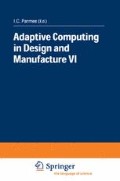Abstract
The formulation of a model for an industrial problem in process design leads to an optimization problem with a small, implicitly defined, feasible region, a region which is difficult to identify a priori. The difficulties of obtaining a good solution with conventional optimization methods are discussed. A novel method is proposed, based on the paradigm of evolutionary computing and a two stage search: the first stage aims to find a set of points covering the feasible region and the second stage is a search for the optimum, modelling the evolution of the population, the set of points, found in the first stage. The results of profit optimization for an industrial case study are presented.
Access this chapter
Tax calculation will be finalised at checkout
Purchases are for personal use only
Preview
Unable to display preview. Download preview PDF.
References
A. Törn and A. Žilinskas. Global optimization. Lecture Notes in Computer Science, 350:1–255, 1989.
Z. Michalevich. Genetic Algorithms + Data Structures = Evolution Programs. Springer, NY, 1996.
H.-P. Schwefel. Numerical Optimization of Computer Models. J.Wiley, NY, 1981.
I. Parmee. Evolutionary and Adaptive Computing in Engineering Design. Springer, NY, 2001.
J. E. Smith. Genetic algorithms. In Panos M. Pardalos and H. Edwin Romeijn, editors, Handbook of Global Optimization Volume 2, Nonconvex optimization and its applications, pages 275–362. Kluwer Academic Publishers, 2002.
K. Miettinen, M. Mäkelä, and J. Toivanen. Numerical comparison of some penalty-based constrainet handling techniques in genetic algorithms. Journal of Global Optimization, 27:427–446, 2003.
R. Smith. Efficient Monte Carlo procedures for generating points uniformly distributed over bounded regions. Operations Research, 32:1296–1308, 1984.
E. McCarthy, E. S. Fraga, and J. W. Ponton. An automated procedure for multi-component product separation synthesis. Computers & Chemical Engineering, 22(7):S77–S84, 1998.
K. Wang, A. Salhi, and E. S. Fraga. Process design optimisation using embedded hybrid visualisation and data analysis techniques within a genetic algorithm optimisation framework. Chemical Engineering and Processing, 43(5):657–669, 2004.
M. Gen and R. Cheng. Genetic Algorithms and Engineering Optimization. J. Wiley, NY, 2000.
L. Kocis and W. Whiten. Computational investigation of low-discrepancy sequences. ACM Trans. on Mathematical Software, 23:266–294, 1997.
E. S. Fraga, K. Wang, and A. Salhi. Interactivity and automated process design. Chemical Engineering Technology, 26(8):823–827, 2003.
P. J. M. van Laarhoven and E. H. L. Aarts. Simulated annealing: Theory and applications. Kluwer Academic Publishers (Dordrecht), 1987.
Author information
Authors and Affiliations
Editor information
Editors and Affiliations
Rights and permissions
Copyright information
© 2004 Springer-Verlag London
About this paper
Cite this paper
Žilinskas, A., Fraga, E.S., Mackutė, A., Varoneckas, A. (2004). Adaptive Search for Optimum in a Problem of Oil Stabilization Process Design. In: Parmee, I.C. (eds) Adaptive Computing in Design and Manufacture VI. Springer, London. https://doi.org/10.1007/978-0-85729-338-1_8
Download citation
DOI: https://doi.org/10.1007/978-0-85729-338-1_8
Publisher Name: Springer, London
Print ISBN: 978-1-85233-829-9
Online ISBN: 978-0-85729-338-1
eBook Packages: Springer Book Archive

